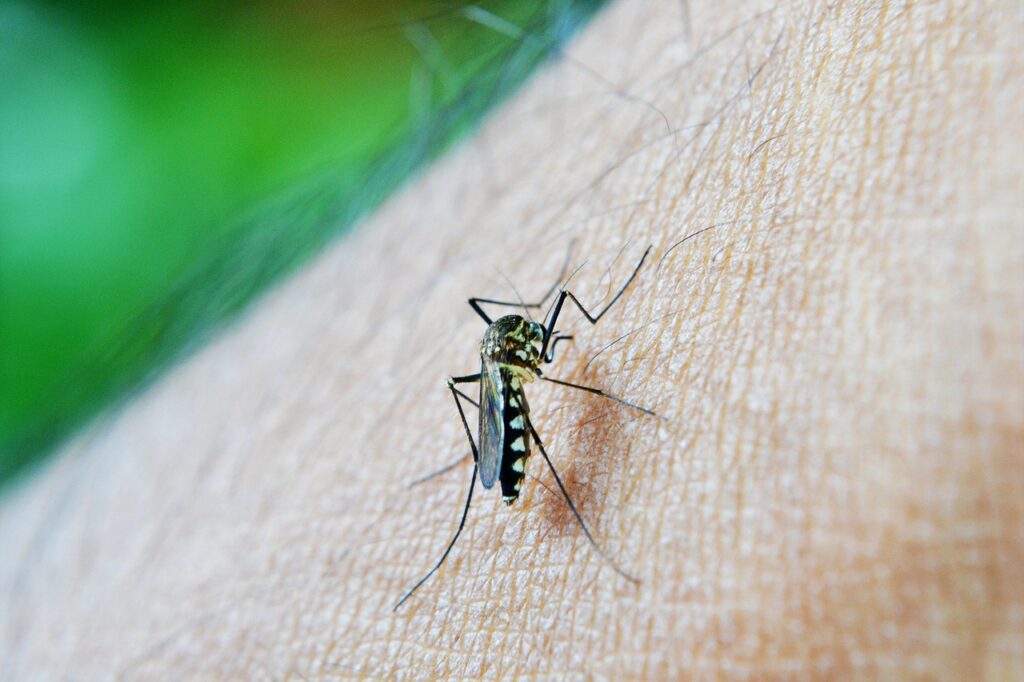If you think about it, you always seem to get bitten by mosquitoes at night. But why is that? Well, mosquitoes are nocturnal — meaning they are more active at night. But it is a little bit more complicated than that…
Why do mosquitoes come out at night?
Mosquitoes are small and vulnerable creatures. Things that don’t necessarily harm you, like wind and the heat from the sun, are enough to kill them. They avoid sunlight and wind as much as possible.
- Sunlight can kill mosquitoes. There are many reasons why animals become nocturnal. Some animals are more active at night to protect themselves from predators. This is the case for rats. But in the case of mosquitoes, they are more active at night to protect themselves from the sun. As small creatures, mosquitoes are vulnerable to the heat of sunlight. They can die from dehydration because of the heat.
- Winds are more tolerable during the night. As small creatures, mosquitoes are also vulnerable to wind. They are very weak fliers and even the weak artificial winds from fans can blow them away. Mosquitoes come out at night because winds are weaker and less obnoxious for them. They try to make the most out of this timeframe, so they do most of their activities during this time of the day.
- Mosquitoes use natural light to navigate. Have you seen those mosquito traps with UV lights claiming that they attract mosquitoes and kill them? These things work because mosquitoes use the natural light from the moon and stars to navigate. They confuse the artificial light from the traps with the natural light from the moon and stars. Mosquitoes are more active at night because these natural lights are of course more visible during the night.

Why mosquitoes at night should concern you
Don’t let their smallness and vulnerability fool you. Mosquitoes have an “impressive” track record in killing humans. Throughout history, they have killed hundreds of millions of people.
- Mosquitoes are some of the deadliest animals on the planet. Vectors are animals that carry and transmit diseases to other animals. Unfortunately, most vectors are bloodsuckers like mosquitoes. Some of the deadliest diseases on the planet are mosquito-borne diseases, including chikungunya, dengue, and malaria. Mosquitoes spread diseases through their bites. And no, mosquitoes don’t just bite people to wreak havoc on human civilization. They bite to survive and reproduce, making mosquito bites an even bigger dilemma.
- There are mosquito breeding grounds around your home. Here’s something that makes everything even worse — these deadly animals are much closer to you than you think. In the wild, they prefer wetlands like rainforests and swamps. They like to breed on stagnant water. But stagnant water can be found in human habitats as well, specifically on your garden, lawn, or yard. There is natural stagnant water, like the one in the craters in your garden soil. And then there is stagnant water in artificial objects, like the one in your unmaintained gutters and ponds.
- Avoiding mosquitoes can be tricky. Mosquitoes are attracted to blood because they need it to survive and reproduce. Obviously, you have blood, and that makes you inherently vulnerable to mosquito bites. Mosquitoes are also attracted to carbon dioxide — you know, the thing you exhale. Avoiding mosquitoes can be very tricky because they are attracted to things that you can’t really get rid of. But that being said, there are some effective things that can minimize the risk of attracting these bloodsuckers.
How to avoid mosquitoes at night
The mosquitoes that come out at night are out there to get you, putting you at risk of mosquito bites and mosquito-borne diseases. Here are some tips to avoid these dangerous animals.
- Get rid of the mosquitoes themselves. If you don’t want mosquito bites, you have to get rid of the mosquitoes themselves. The idea itself is simple, but its execution may require extensive work. First, get rid of the stagnant water outside your home to prevent them from becoming mosquito breeding grounds. Second, clean and disturb the dark and moist parts of the inside of your home. These include cabinets, dark corners, inaccessible areas like attics, basements, and crawlspaces, and the areas below sinks.
- Cover yourself. Mosquitoes are such small creatures that it’s easy to miss them. They can also get inside your home if you have open doors and windows. Sometimes, the best way to avoid mosquitoes at night is not to get rid of the mosquitoes themselves but to cover yourself. You can literally cover yourself with blankets, long-sleeved clothes, mosquito nets, and socks. But you can also cover yourself with ingredients or products that repel mosquitoes. OFF® and REPEL® are some of the most popular mosquito repellent brands out there.
- Make your surroundings unattractive to mosquitoes. You can also change the conditions in your home to make it unattractive and unsuitable for mosquitoes. Because mosquitoes don’t like wind, you can turn on the fan while you sleep to avoid mosquito bites. You can also turn on your air conditioner because mosquitoes don’t like cold and dry air either. Many people use bug zappers to make their homes hostile places for mosquitoes. Please don’t do this. Bug zappers are not effective against mosquitoes, and they may cause more harm than good in your surroundings.

Mosquitoes are nocturnal animals
Mosquitoes come out at night because it’s the time of day when they are least vulnerable to heat and wind. But don’t let the smallness and vulnerability of mosquitoes fool you. They are some of the deadliest animals on the planet, killing millions of people a year even today. They are also closer to you than you realize, as many potential breeding grounds are inside and outside of your home.
Protect yourself from mosquitoes and their bites by getting rid of the bloodsuckers themselves. You can also cover yourself with clothing, apply repellents on your skin, and turn on the air conditioner to make your home less attractive to these pests.

